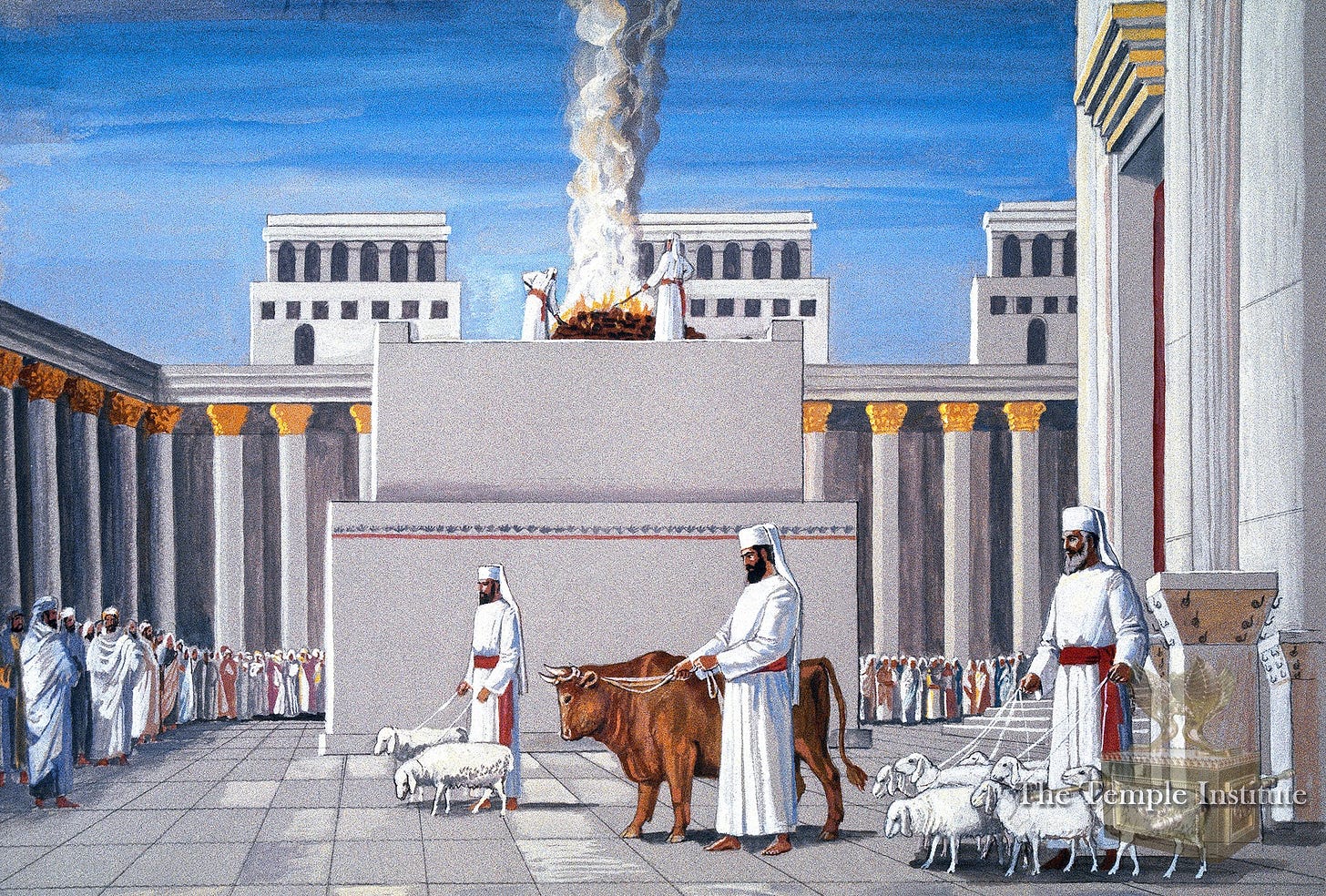Vayikra
The Purpose of the Korbanos
The Rema in his Sefer Toras Haolah1 brings ten opinions for the purpose of the korbanos. I will only focus on two of the main views: Those of the Rambam and Ramban.
The Rambam famously writes that the reason we were commanded to bring korbanos is that bringing sacrifices was the prevalent mode of worshipping idols at the time of matan torah. It is hard for people to adjust to new ideas. Hashem knew that Am Yisrael would be unable to accept worshiping Him in any other way. It would be as if a prophet would come today and say that Hashem commanded us not to daven anymore. The Midrash2 seems to support this position.
Rabbi Sacks writes the following:
It is an understatement to say that Maimonides’ view received a mixed reception from Jewish thinkers in subsequent ages. He seemed to imply that sacrifices were necessary at one historical period in the development of the Jewish people, but not for all time. This could not, in fact, be his view. Two chapters later, in the Guide, he states categorically: “The laws cannot vary . . . according to the different conditions of persons and times . . . It would not be right to make the fundamental principles of the Law dependent on a certain time or a certain place.”
In fact, however, Maimonides is making two fundamental and important observations. The first is that the commands do not constitute an undifferentiated set of imperatives and prohibitions, each standing, as it were, alone. For Maimonides, there is a logic to the law. The Torah as a whole is a system designed to bring about certain fundamental transformations: a society built on justice and compassion, individuals schooled in what is today called “emotional literacy,” and a set of true opinions widely diffused within society, as to the nature of reality and our place within it. The second is that Torah takes into account what philosophical systems rarely do, namely the dimension of time in social transformation.
The Ramban3 strongly rejects this view. How can it be that korbanos are only to counter the foolish customs of idolaters? Additionally, the Torah calls korbanos: “לחם אשה לריח נחוח” - “the food of the fire-offering for a pleasing fragrance.”4 Finally, the Ramban asks that Hevel and Noach brought korbanos before the idolaters started offering sacrifices.
The Rema writes in defense of the Rambam that although the custom to offer sacrifices did not emerge until later, from the days of Adam there were already idol worshippers. The korbanos of Adam and his sons directed to Hashem, also counteracted idolatry. Why did they choose sacrifices as the way to worship Hashem? Adam and his sons did not know how to serve Hashem. They logically concluded to serve Hashem by way of sacrifices just as the idol worshippers came to that conclusion. In truth, however, Hashem needs no sacrifices. Hashem would have been pleased by any other form of worship.
The Ramban offers a different explanation:
Man’s deeds are accomplished through thought, speech, and action. Therefore, when a person sins, he brings an offering and lays his hands upon it corresponding to the act, he confesses his sin verbally corresponding to his speech, and he burns the innards and the kidneys because they are the instruments of thought and desire. He burns the legs of the korban corresponding to the hands and feet of a person, which do all his work. He sprinkles the blood upon the mizbeach, corresponding to his blood.
All this is for a person to realize that he has sinned against Hashem with his body and soul and that his blood should be spilled and his body burned, were it not for the chesed of Hashem, who took a substitute so that its blood should be in place of his blood, its life in place of his life, and that the limbs of the offering should be in place of the limbs of his body.
The Ramban only addresses korbanos that are brought for sins, however many korbanos are brought for other reasons. Perhaps we can broaden the idea of the Ramban to include these as well. The korbanos are a means to inspire a person to submit to Hashem. By offering a korban corresponding to oneself, one expresses that his existence is only by the will of Hashem. This is an appropriate expression for all types of korbanos.5
The topic of bringing korbanos in our times is a fascinating one. I did not have time this week to write about it, but hopefully I will in the future. May we be zocheh to the complete fulfillment of the pasuk:
וַהֲבִיאוֹתִ֞ים אֶל־הַ֣ר קָדְשִׁ֗י וְשִׂמַּחְתִּים֙ בְּבֵ֣ית תְּפִלָּתִ֔י עוֹלֹתֵיהֶ֧ם וְזִבְחֵיהֶ֛ם לְרָצ֖וֹן עַֽל־מִזְבְּחִ֑י כִּ֣י בֵיתִ֔י בֵּית־תְּפִלָּ֥ה יִקָּרֵ֖א לְכָל־הָעַמִּֽים
I will bring them to my holy mountain and make them joyful in my house of prayer. Their burnt offerings and their sacrifices shall be accepted on my altar; for my house shall be called a house of prayer for all the nations.
Yeshaya 56:7
Now we see how precise the prophetic words of Yeshaya are. First Am Yisrael will come to the Har Habayis and only sometime later will the Beis Hamikdash be built.
2:1
Vayikra Rabbah 22:8
1:9
3:16
See Sefer Hachinuch 95.



